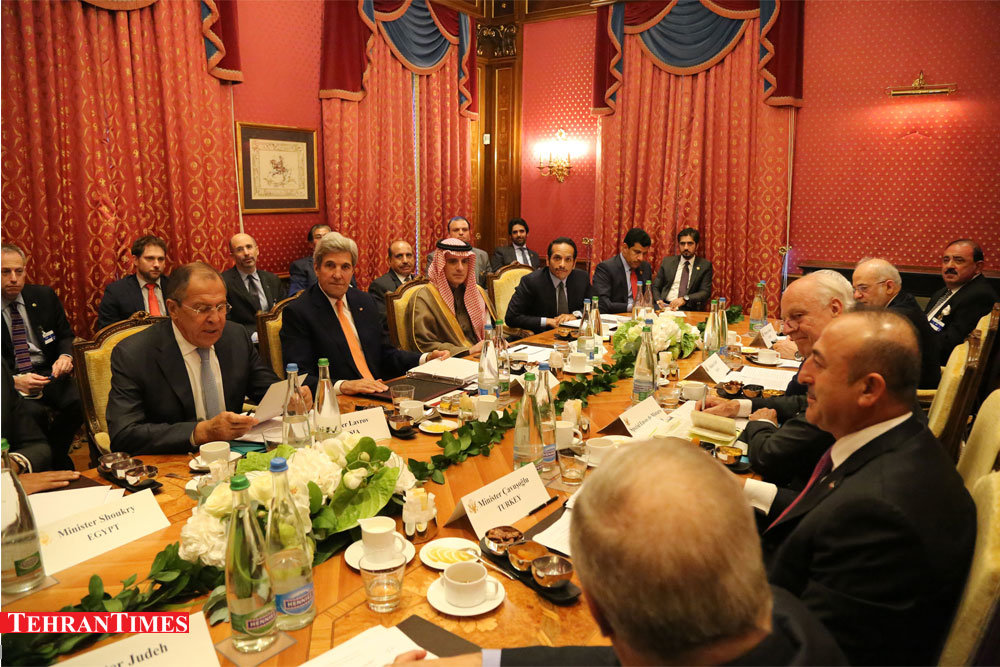Zarif 'wanted Egypt at Syria talks' as Middle Eastern alliances shift

The Iranian foreign minister personally requested that Egypt attend last weekend’s key Syria talks – a move that has sparked concerns that Cairo is being wooed away from its traditional pro-western stance in the region.
Talks convened by the U.S. secretary of state, John Kerry, in the Swiss city of Lausanne last Saturday evening failed to agree on a common strategy with Russia to end the conflict in Syria, now in its sixth year.
The Guardian has seen emails indicating that the Iranian foreign minister, Mohammad Javad Zarif, asked Kerry for Cairo’s team to attend the Lausanne talks. When the U.S. secretary of state proposed six-nation talks to “see if a new reasonableness can manifest itself” in Syria, Zarif replied: “Why not Egypt too?”
Iran agreed to attend the talks only once it had secured places for the foreign ministers of Egypt and Iraq at the discussions. Both countries back the pro-Assad stance of Iran but Egypt is seen as significant because it is the most populous Sunni Arab nation in the Middle East.
Iran was also keen not to be outnumbered by an anti-Assad coalition – comprising Turkey, Qatar, Saudi Arabia and the United States – at the Lausanne talks.
The lobbying for Egyptian officials to attend the talks began a few days before Egypt shocked its financial backer Saudi Arabia by voting with the Russians to block a draft French UN security council resolution on Syria, which had demanded an end to airstrikes on Aleppo and military overflights.
At the UN, the Saudi envoy described Egypt’s decision as “painful”, adding that “stances by Senegal and Malaysia were much closer to the agreed Arab decision” than that adopted by the Arab League member Egypt. The next day Riyadh suspended its oil aid to Egypt – estimated at 700,000 tonnes of petroleum products every month.
It was the first public dispute between Egypt and Saudi Arabia since Egypt’s president, Abdel Fatah al-Sisi, ousted the Muslim Brotherhood’s Mohamed Morsi in 2013. Since then, Saudi Arabia has sent billions of dollars to Egypt, which have helped keep its faltering economy afloat.
The rivalry between Saudi Arabia and Iran, in which both compete for the hearts and minds of the Arab street, sees them regularly seek to curb each other’s influence and standing in the Middle East.
In Egypt, one of the cultural hubs of the Arab world and home to more than a quarter of its people, Tehran sees a counterweight to Saudi hostility in the high-stakes diplomacy over the future shape of Syria.
It is clear that in the short term both sides are engaging in no-holds-barred diplomacy over the Syrian imbroglio.
In an effort to bring the big players in the region together, Kerry emailed Zarif on 4 October, after the last nationwide ceasefire between the U.S. and Russia had broken down, resulting in the bombardment of the Syrian city of Aleppo.
Kerry said he had discussed with the Russian foreign minister, Sergei Lavrov, having “a very small meeting of key stakeholders on Syria. He is very much for it. So am I. This is not a negotiation but a consultation.
“The purpose is to explore the political solution and see if a new reasonableness can manifest itself and to discuss how we can change this dynamic – if possible.”
The U.S. secretary of state added that “the participants would be Russia, Iran, Turkey, Qatar, KSA [Saudi Arabia] and the U.S. Could you be in Lausanne on Saturday 15th afternoon to take part?”
In response Zarif said he would try to attend, noting that he had to be back in Tehran the following day to receive African foreign ministers. He added: “Why not Egypt too?”
After days of wrangling, Iran’s deputy foreign minister for Middle Eastern affairs told journalists that “big news will be released soon”. Hours later it was announced that what was billed as a small Syria contact group meeting in Lausanne would now include Egypt and Iraq to bolster Iran.
Sadegh Ghorbani, a journalist at Fars – the “semi-official” news agency of the government of Iran, tweeted that it was “interesting how Sisi’s Egypt [is] gradually shifting from US-Saudi axis towards Russia-Iran. Tehran-Cairo relations revival maybe q[uestion] of when not if.”
The two countries have had not had full diplomatic relations since 1980, when Egypt offered Shah Mohammed Reza Pahlavi refuge following the revolution in Iran. However, Egypt and Iran have drawn closer over support for the Assad regime in Syria and in welcoming Russian military cooperation.
Some argue that Egypt’s moves are purely tactical. HA Hellyer, a fellow at the Atlantic Council and London’s Royal United Services Institute, said: “Egypt has its own perspective on Syria which happens to converge with the Iranian one. Cairo wants a viable Syrian state and is worried about Islamist groups. With regard to extremists, that is a valid concern. On the other hand, Egypt has often flirted with the Russians, seemingly to show the west that Egypt has options.
“The Saudis made a strategic decision long ago. Egypt is too big to fail. Riyadh does not want chaos unfolding in the region and will do whatever it takes to keep Egypt’s economy afloat. Egypt has 90 million people [and relations] are not to be toyed with.”
When contacted a U.S. State Department official, speaking on condition of anonymity, said there would be no comment “on private diplomatic communications”, adding that “the U.S. relationship with Egypt is based on a number of priorities, including our common interest in defeating terrorism and resolving the conflict in Syria”.
(Source: Guardian)
